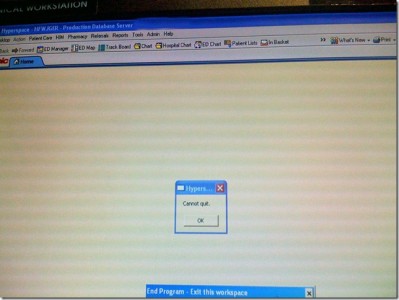We’ve been all electrical in our ED for nearly four days now. How do we like it?
Tonight, we couldn’t get the registration system to talk to the EMR, and it was decided “Well go pack to paper”. None of us was happy about that.
Really. 4 days in, we’ve seen the light, and none of us wanted to go back to paper.
Terrific, actually.




Whoa. Really? I’ve never heard of such a fast adoption.
When we were installing our EDIS, I spoke with another medical director who told me, “even if it goes well, expect your staff to burn you in effigy for about three months.” That was consistent with our experience. May I ask which system you have installed?
I bet it’s NOT Cerner.
What have you done with GruntDoc??
Epic.
Heh. It’s still me.
It’s amazing how much more efficient the CPOE is. Plain films get done so much faster than before (the order entry process for those was truly byzantine), seeing the labs come back in real time, etc. I’m not a tech polyanna, but the switchover has gone a whole lot better than I’d have thought before.
It helps that the people at our parent / sister hospitals have rolled this same thing out before, so there’s a lot of institutional knowledge to be drawn on, and our problem solvers are pretty good at doing just that.
Grunt,
What system are you using?
The system is called EPIC.
What are you using for notes on the patient? Dictation, written, templates, freestyle typing? How’s that adoption going?
We are in the initial process of building our EPIC system. Glad to hear it is good for you!
Ian, we have scribes that do a combination of free-texting for the CC, and have some very slickly templated ROS and PE modules. It’s amazing these kids are so very good at it. And they’re fast and accurate, too.
thanks — we’ve made templates that a motivated doc can modify without much help – one guy has about 30 variations that covers most patients. We also have a transcription module built into the EMR system so the voice note is always attached to the chart.
We went to complete EMR in our ER about 2 months ago. I love the system and find that so much more is documented with much less time. I was surprised to find that those most resistent to the change were the doctors; but even that has changed now. I like the fact that we can “tweak” our system to do what we want for our particular hospital. I’m one of the people who changes the documentation to say what we want it to say. We’ve built our own QA requirements in the system and have made it impossible to leave the chart unfinished without having something “flash” at you stating a required field is incomplete. Our core measures have improved greatly along with our compliance for our quality compliance. I just can’t say enough good things about our EMR.
I am now in the progress of getting my daughter’s doctor’s office off the ground with an EMR…. it will be able to capture those minute lost charges that PCP lose each year in addition to reminding the doc that a patient is due for routine labs, X-rays, etc.
In any decent EMR, this is the expected result. We have had it in the office for several years now, and it’s really indispensable.
Even in the hospital, when faced with the choice of bringing an old record up yourself online, or getting a paper chart brought in from medical records, which is more likely to happen?
I do envy anyone who has the ability to customize the performance of their EMR, since we can’t do this in the office (to any significant degree), nor in any of the hospitals I go to. One serious deficit of the EMR makers seems to be an understanding of the need, the power of being able to search for information in old charts by category, by content, by various other things we do ALL THE TIME on the internet.
I am so glad to here there is hope on the horizon for EMR’s. I work just miles from silicon valley, and I find it odd that none of the local ED’s around here (that I know of) have EMR’s. The EMR’s I have used in California have been abysmal. I can not wait for a critical mass of decent systems to take hold. I have a couple of theories regarding why this has been the case in most hospitals that I have spoken about in my blog. I’m also hoping to get a list and discussion of great ED products/systems on the left side-bar for easy reference. I’m trying to keep it positive so I am only including good things there (not to mention the fact that we could fill a lot more pages with things we don’t like, and ultimately that may not be as helpful).
Jessica
Now if we could only the the physician’s to realize that we need to have access to the computers on the central desk, since that is where the phones are!!!!
Kind of hard to call the floor to tell them a patient is ready to come up or call report to ICU, notify CT that the patient has completed their PO contrast and that we are coming over with a level 1 trauma, or to call the attending physician for orders on the hold patients. Never mind getting access to the Language line phone, it is buried behind the computers, hope you don’t need it.
But I guess that is not as important as their order entry. After all the scribe has a laptop to do the charting, enter orders, and notes. I will grant them that is does take about 30 seconds to release the pending orders, wouldn’t want to slow them down.
Look at the big picture, and see that the nurses have a tough job too.
Gruntdoc, I’m glad your EMR is working out well but am I right that you’re not actually doing order entry or entering notes? That’s kind of like saying your new car drives great because your chauffeur told you so. It sounds like a big part of the reason your EMR works well for you is that you have excellent support staff, while in many hospitals one reason for the EMR is to REPLACE the support staff.
We do our own CPOE. We have our scribes, who used to help with the documentation on paper, now do it in the EMR. Physicians in high-volume, high acuity places that aren’t using scribes are losing a lot of efficiency.
EMR system is to improve work flow and overall efficiency within the practice and allow providers to provide enhanced quality care and patient safety.EMRs helps in keeping records of health information that patients tend to forget with time, i.e. inoculations, previous illnesses and medications
I agree with Goatwhacker that its the staff that runs the hospital not EMR system, they only help in saving valuable time and in managing records of patient and make them easily accessible by doctors when needed